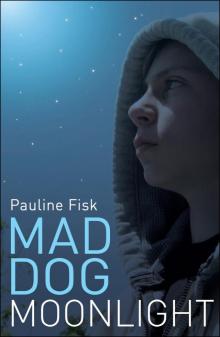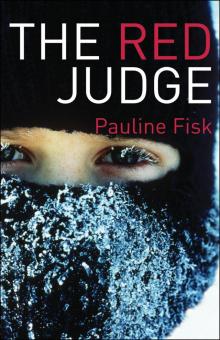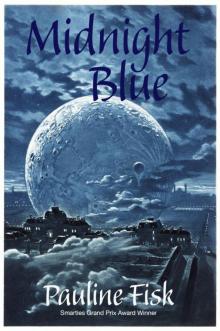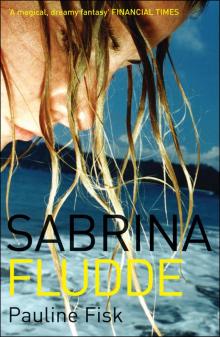- Home
- Pauline Fisk
Sabrina Fludde Page 16
Sabrina Fludde Read online
Page 16
Abren looked into her mother’s face. ‘What happened to my father?’ she said, seeing secrets in it, prisoners to the hate. ‘The king of Pengwern? What became of him? You know, don’t you? He’s here somewhere, isn’t he – still alive, like you and me? Don’t tell me he’s not, because I won’t believe you. You’ve got him somewhere, haven’t you? You’ve done something to him.’
Old Sabrina didn’t answer, but her face said it all. Suddenly, it was her father’s face, right down to his remorseless black eyes. And Abren knew why the river had brought her back to Pengwern. It wasn’t just to find herself and the answers to her questions. It wasn’t even to find her mother. It was to end the hate.
She hauled Old Sabrina out of her chair, regardless of swollen feet, and dragged her across the floor to the mirror.
‘Take a look!’ she cried. ‘See what I see when I look at you! See what hate has done! You could have fought it, but you fed it instead! Could have fought Gwendolina’s curse, but you chose to live with it! So don’t blame love for what you are. Don’t blame anyone. You did it to yourself!’
The old woman stared at her wrinkle lines as deep as knife wounds, eyes as black as bogs, and bitter mouth. By now half the ceiling was down, and the chandelier with it. Rain scoured the room, driven by the storm, and yet more water came through the door.
‘Whatever happened in the past is over!’ Abren said. ‘The flood’s rising and we’ve got to stop it. Stop it in its tracks and end the hate. Break the power of the mountain man. And only we can do it! The two of us together. Abren and Effrildis. And if we don’t, not only we but the whole town will be lost!’
Old Sabrina stared at Abren in the mirror. She didn’t want to break the power of anything. You could see it in the way she held her head. Didn’t want to be Effrildis. Just wanted to be left alone.
But she was Effrildis. Despite everything.
‘Find your precious father, if you must, and bring him here. I’ll never forget – so don’t ask me that. I’ll never love him like I did. But I’ll try my best to forgive.’
She turned her face away. Abren sighed, but her relief was short-lived.
‘I don’t know where to look,’ she said.
‘He’s where he always has been, all alone,’ her mother said. ‘A king in his own kingdom. Where I left him on the day when you were snatched. In his palace. The Palace of Pengwern.’
The Palace of Pengwern
Abren left the waiting room the way she’d done it before – through a boarded window. She dropped to the rusty railway track, squeezed between the Guinness hoardings and climbed on to the old abandoned platform.
Here the railway lines no longer snaked their way out of town, but disappeared beneath the flood. The view was unforgettable, lit by a single helicopter searchlight, circling overhead. The river had risen level with the top of the railway bridge, and covered everything in sight, except the station platforms and a single signal box.
But Abren didn’t have the time to stop and marvel. She made her getaway while she could, hoping against all hope that Old Sabrina would be safe, standing against the flood. She ran down the platform and through the gate at the end. Here the path was dry, but the station forecourt underneath it lay beneath metres of water. The roads around the station were flooded too, and so were the pubs and shops. Only the high town remained dry – if dry were the right word for it!
Abren hurried along the path up the hill, battling against overflowing gutters, bursting drains and water gushing out of broken basement windows. Streams poured down the road, and the town was dark without its streetlights.
But it made no difference whether Abren could see or not. She didn’t know where she was going. Didn’t have a clue where her father’s palace might be in this modern town. Didn’t even know how she’d recognise her father when she found him.
She tried to imagine him, tall and stately, with a kindly smile and looking like a king. Tried to trust her memory. But as she had discovered, memories were strange things – they didn’t always turn up what you expected!
Abren did her best all the same, searching through the rain for palaces and kings. People passed her by, but none of them were likely candidates – figures stooped beneath the rain, crying to each other about the highest flood in recorded memory, and how they’d always remember it. They thought it was exciting – one of those occasions like millennium night, which they’d tell the grandchildren about in years to come. They didn’t realise what danger they were in.
Abren hurried past them, knowing only too well! Rain blew into her face like a hail of arrows. It stung her skin and the cold wind tried to force her back. But she pressed on all the same, looking everywhere for a bit of old wall, a window or a gateway that would bring back memories. She passed the old library with its ancient porch and columns carved in stone, passed the half-timbered houses on the hill, reached the castle gate, and stood under its old arch, sheltering from the rain.
But here, yet again, was nothing that she recognised.
She turned to carry on. But suddenly she saw a little tower built into the far side of the castle wall. It was covered in scaffolding, and was in a state of disrepair. A crumbling staircase wound up its side, cordoned off with a sign which read, DANGER. FALLING MASONRY. KEEP OUT!
At the sight of it, not even falling masonry could have kept Abren out. She ran across the castle’s inner courtyard, slipped under the cord and bounded up the steps, two at a time. Surely here in this old tower, which had withstood armies and the ravages of time, her father would be waiting! She reached the top and rushed across the flat roof, sure that she would find him. But nobody waited for her. The roof was empty, save for a flagpole flapping in the wind.
Abren struggled to stand upright. Tears pricked her eyes with disappointment. She turned to go, and a helicopter arched overhead. Its searchlight passed over the flood, and in it Abren saw the floating shapes of bikes and cars, bits of furniture, children’s toys, old doors, bales of hay, trees torn from their roots and boats torn from their moorings. She even saw a dead dog, caught in the circle of light, and a couple of dead cattle.
Precious lives – and all lost! Precious belongings which had had their places in memory and affection! And all of them swept away!
Abren knew that she had to find her father – and quickly, too, before the whole town was destroyed. She turned to climb down from the tower, and something caught her eye, lit up by the helicopter. There it stood in the highest part of town, safe above the flood waters and surrounded by trees.
The ruined outline of Old St Chad’s church.
Crows were sitting on it – dark shapes crouched like silent witnesses, black as mourners in their soaking feathers. And suddenly it was all just like the poem had said – the one for which the schoolboy had got a big ‘well done’. The legend of Sabrina Fludde, complete with weeping walls. And they were weeping still – weeping with the rain!
Abren looked at them – and remembered them …
She left the tower, as if no wind and rain could ever hold her back, tearing out of the castle and through the town, past lanes where once she’d skipped and played – and now she could remember them! She tore past the high town cross, where they used to hang men in her father’s day. Tore down Pride Hill, where the hawkers used to sell their wares and buskers played. Tore through Dogpole Alley and into Old St Chad’s Square.
And here she didn’t need the schoolboy’s poem to tell her that she had come home!
She stopped running at last. Looked at the old church on its grassy mound, and saw, beneath its crow-lined walls, the once white stones of a great hall. Saw smoking fires, and people clustered round them. Saw sweeping staircases, and rooms hanging with tapestries. Saw one room in particular, and it was her room, with her narrow bed in it, and her mother stitching at the window.
Everything she saw was here somewhere, buried under centuries of other buildings, other lives, generation after generation. And now only the tallest walls remained, bui
lt into a church which – in its turn – had become a ruin.
Abren saw it all at last. And she saw the moment when her happiness was snatched away. It had happened right here in this square! She should have realised when that awful woman turned upon the child. But the memory had been too powerful – and she hadn’t dared.
Abren crossed the square. She knew what she was here for, and she knew where to look. She reached the mound and started round it, trusting to her memory. Found the iron-grilled gate and slipped through into a darkness which was cold and wet – full of water, just like all the basements across the town.
But it didn’t deter Abren – and neither did the knowledge that something nasty had once scared her down here. She had to do this, for her mother’s sake, and for her own, and for the town. She edged into the darkness, waist-deep in icy water.
‘Father,’ she whispered. ‘Father … Dad … Daddy … Your Majesty … this is me, Abren, calling you. Do you hear me?’
There was no reply, save for slapping water against a far wall. Abren waded on – and tried again in a louder voice.
‘Father! You must be here somewhere! I know you are! Answer me!’
Still no one answered. All Abren heard was her own voice echoing in the darkness. She tried again, shouting this time.
‘KING OF PENGWERN – DO YOU HEAR ME?’
Again there was no reply. Abren struck a wall, not realising how close it was, and bloodied her face. She leant against it, weeping with frustration and shivering with a cold that started deep down inside and had nothing to do with flood waters. Finally, she started to feel her way along the wall again, muttering and whimpering, but this time not expecting a reply.
‘Father, oh, father, oh, please! Mother’s waiting … Effrildis, that is … Wants to make amends … make peace, put things right! Get you to her … flood waters rising … break the curse! End the hate, or we’ll all drown!’
This last was clearer than the rest – and likely to happen sooner than Abren had expected! Water suddenly came pouring through the iron-grilled gate from the road outside. Abren turned at the sound of it, and gasped in horror at the realisation that the flood had reached even Old St Chad’s Square, at the top of the town. She turned to get out as quickly as she could, and touched something in her panic. Touched something clammy, as she had touched it once before.
Abren screamed. She tried to get away and dimly made out something crouched high on the wall. The smell wafting down from it was overwhelming. It came from rotten clothes, hanging in rags. Bursting boots and filthy feet. Matted hair and a stinking beard. Parchment-yellow, long teeth, and glazed eyes shining almost white as they looked down upon Abren.
Her hands flew to her face, and her heart rattled like a drum roll. She had found a mother turned old by hate. And now, perched on a ledge above the flood, she’d found a father, too. She knew she had. And what a father! Not the one she’d hoped for, tall and stately, with a kindly smile and looking like a king. But the man her mother had loved. And Abren must have loved him too, because she was his daughter. And she’d hoped to recognise him when she saw him. And she did.
He was the Chadman.
Part Seven
Queen of Rivers
A pinch of dust
Abren emerged into the square to find people at windows, standing behind their curtains witnessing a drama which affected all their lives. The flood had reached them at last! It flowed round the square, surged through their gates, dashed up their garden paths and battered their front doors.
Abren knew it was too late to get back to the railway station. She looked around in desperation – and there stood Bentley on the grassy mound. Bentley – who had been out, like half the town, to marvel at what was going on. And now here he was, stranded just a few steps from his home, staring wide-eyed as if Abren were the last person he expected to see!
She scrambled up to join him, dragging the Chadman after her, staring round at his deluged square as if he couldn’t believe what had happened to it. The rain poured down and the wind lashed into them, but he scuttled into the shelter of his ruined palace walls as if he didn’t care about anyone but himself. He was no king standing up for his subjects, no father offering his daughter protection. He didn’t call Abren by her name, nor turn to make sure that she was all right, nor offer her the benefits of age and wisdom. He was like a little old lost child, whimpering against the wall, desperate to go home.
Not that there was any home to go to – not any more! Abren looked past Bentley to the faces at the windows. Scuds, Phaze II had called them. Stupid scuds. And the flood would get them, too. They could climb up to their attics, climb the trees which grew on the mound, climb the highest town walls. But nothing in this town was beyond the reach of the rising waters. It would get Bentley, who watched the waters inching closer all the time. And it would get the Chadman too – poor old, shambling man who’d helped himself to one too many wives, but didn’t deserve a fate like this! The flood would destroy them all. And it wasn’t fair. It wasn’t their battle – it was hers.
Abren looked about her in despair. Where was the Misses Ingram’s amber mead, shining with a light which summoned armies of bees? Where was the river, which had been Abren’s rescuer? Where was anything that might come to their defence, from Sir Henry Morgan’s cutlass to Effrildis’s elven wisdom? Elven wisdom – the stuff of legends, and Abren’s blood inheritance!
Where was it now?
The waters rose round the square, beaten on by the wind. In it, Abren could have sworn she heard the baying of the Cŵn y Wbir. Sworn she heard the mountain man’s voice, calling that she could stop it all by giving herself back to the flood. Right here, right now, jumping the jump that really mattered, and then it would just be between the two of them again and nobody else need get hurt.
Abren took a step, and might have jumped. But suddenly – as if he realised what his long-lost daughter was in danger of doing – the Chadman grabbed her hand. She struggled to break away, but he wouldn’t let her go. The wind lashed into him, twice as fiercely as before, but it was as if he had decided to be her father, after all. Decided to be a king, standing up against all comers! No matter that the rain poured down on him in a torrent of new proportions, or that the wind beat hard enough almost to sweep him off his feet – the Chadman clutched Abren with one hand and raised the other to the sky.
He held it up the way he did when feeding the birds.
And down they came.
Down through the stormy night, as if they owed the Chadman one for all those feasts back through the years! Down from trees and flooded gardens, from gutters and ruined palace walls. Not just black crows in funeral dress, but soft, grey pigeons and pink-and-gold finches, small, brown wrens and red-breasted robins, bright little wagtails and bully-beef magpies, tawny thrushes and spangled starlings. Every colour imaginable, and every shape, birds that sang and birds that were silent, green birds, blue birds, yellow ones, turquoise, brown birds and white.
Yes, even snowy swans, wheeling through the sky as if they had it in them to do more than just kill! And ghostly herons, too, as grey as morning light, and shags like prehistoric creatures, and darting little gold-and-turquoise kingfishers. From the shyest to the boldest – they all came down.
And everybody watched them, standing at their windows, holding back their curtains. All the people of Pengwern, watching as a great company of birds, big enough to fill the sky, fell down upon Abren and the Chadman, plucking their clothes, latching on to their hair, stretching their talons across them and getting them in their webby, spidery, clawlike grip. They watched them get hold of arms and shoulders, neck and hands, legs and knees, and lift them upwards, dragging them off their feet.
Then the whole great cloud – beating like a single pair of wings – rose into the sky. A single bird of power, it carried them through the storm, and nothing could stop them. The Chadman cried as if he’d always dreamt of flying free at long last, but never believed that it would happen. And certai
nly not like this!
And Abren cried as well. Behind her, she could see an astonished Bentley climbing into a tree, the better to watch their journey across town. He waved them on their way, and everybody else waved too – the people of Pengwern, wishing them godspeed.
Abren waved back. The birds carried her over Dogpole Alley, up Pride Hill, past the old town cross, down past the castle and finally to the railway station. Here the flood had changed the landscape beyond recognition. Abren stopped waving, and her heart sank. She had come too late! The main building lay under water, and so did the platforms. The Guinness hoardings stood half submerged, and every trace of the once-great iron railway bridge had gone.
It had completely disappeared.
They flew over the spot where it had been. Abren looked down, imagining thick, black waters flowing between the bridge’s hidden arches and its girders, filling its chasms and soaking through its dark places. She imagined it finding all the hidden corners and filling them with black poison, clogging up the stairways and flooding the waiting rooms fit to burst.
Nobody could survive those flooding waters. Not even Old Sabrina could hold them back.
The birds circled the abandoned waiting rooms, and Abren could have wept. One half of the roof remained, but the other half had caved in. There was no sign of Old Sabrina, but as if the birds didn’t realise that the battle was over, they deposited Abren and the Chadman on the remains of the ridge, between the chimney pots. Then, as if their job were done, they rose back into the sky – not a single tight cloud any more, but every bird for miles around making its own way home.
The Chadman waved a wild goodbye, as if he hadn’t realised yet what Abren could see plainly – that they had come too late.
‘I always dreamt of heights,’ he said. ‘Of tightrope walking between spires. Of flying over rooftops. But I never thought I’d do it!’

 Mad Dog Moonlight
Mad Dog Moonlight The Red Judge
The Red Judge Midnight Blue
Midnight Blue Sabrina Fludde
Sabrina Fludde In the Trees
In the Trees